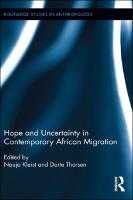Hope and Uncertainty in Contemporary African Migration
Proposal review
Contributor(s)
Kleist, Nauja (editor)
Thorsen, Dorte (editor)
Language
EnglishAbstract
This volume examines the relationship between hope, mobility, and immobility in African migration. Through case studies set within and beyond the continent, it demonstrates that hope offers a unique prism for analyzing the social imaginaries and aspirations which underpin migration in situations of uncertainty, deepening inequality, and delimited access to global circuits of legal mobility. The volume takes departure in a mobility paradox that characterizes contemporary migration. Whereas people all over the world are exposed to widening sets of meaning of the good life elsewhere, an increasing number of people in the Global South have little or no access to authorized modes of international migration. This book examines how African migrants respond to this situation. Focusing on hope, it explores migrants’ temporal and spatial horizons of expectation and possibility and how these horizons link to mobility practices. Such analysis is pertinent as precarious life conditions and increasingly restrictive regimes of mobility characterize the lives of many Africans, while migration continues to constitute important livelihood strategies and to be seen as pathways of improvement. Whereas involuntary immobility is one consequence, another is the emergence and consolidation of new destinations emerging in the Global South. The volume examines this development through empirically grounded and theoretically rich case studies in migrants’ countries of origin, zones of transit, and in new and established destinations in Europe, North America, the Middle East, Latin America and China. It thereby offers an original perspective on linkages between migration, hope, and immobility, ranging from migration aspirations to return.


 Download
Download